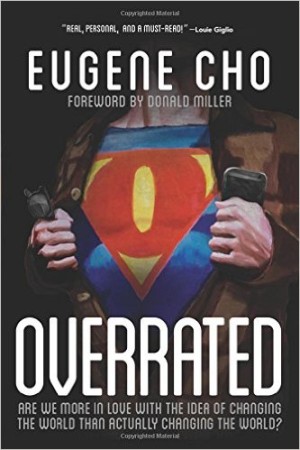I have a habit of downloading interesting books to my Kindle when they are on sale. I can hardly pass by a book that costs only $1.99. At least all these virtual books I collect aren’t cluttering up my bookshelves, and yet they still seem to languish, unread. So when I saw a link to Eugene Cho’s Overrated, not only did I download it, but I began to read it the next day!
We love justice until there’s a cost to us. Our generation has been given so much, and yet we’ve done so little, which may result in us being the most overrated generation. The full title gives us even more of a hint to its content: “Are we more in love with the idea of changing the world than actually changing the world?” This video gives a good introduction:
Cho begins this book with an example of when he and his family actually did do something drastic. In order to complete a fundraising goal, they moved out of their house and couchsurfed for weeks when someone put up an offer to rent their home for $10,000. As is the video, the book is very confessional in nature. Cho causes the reader to think by boldly sharing ways in which he tried to help, and yet because of not understanding the true need or bothering to properly pray or research the situation, he ends up bungling things.
This is a book of questions. Yes, there are some answers, but mostly reading the book causes the reader to think about what she has done — or not done — in the face of social injustice. More importantly, he repeatedly makes statements such as this:
I fear that we’re asking God to move mountains, forgetting that God also wants to move us. And in fact, it may be possible that we are the mountains that need to be moved
—Overrated, Chapter 1
Other chapters explore “The Tension of Upward Mobility,” and the problem with all of the input in our lives, advising us to “Shut Up, Listen, and Pray.” The most enlightening chapter for me was probably “The Irony of Doing Justice…Unjustly” in which he shares examples of communities that are not helped, or possibly are even hurt, by the aid that groups offer. For example, a church which allowed its building to be painted several times of the course of a summer by different short term missions groups, which spent more money getting to the destination than they actually gave in true aid. And what about companies like Bob’s and Tom’s, which donate a pair of shoes to a needy individual every time we wealthy Americans buy a pair for ourselves. What does this to do that local economy? Does it help? Or hurt?
This was a quick read and one I’m glad I took them time to complete.
